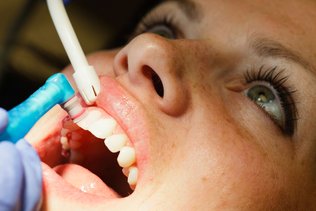
Why Is It Important To Get Teeth Cleaned?
If you want to increase the odds of keeping your permanent teeth for the rest of your life, it pays to have a check-up annually and at least two dental cleanings. You will find that one dental cleaning per quarter is not too much. Choosing to follow a consistent regimen with professional dental care will pay off in a big way. Here are some of the benefits that make regular cleanings so important.
Start With That Beautiful Smile
When you think of a dental cleaning, the impact on your smile is likely the first thing that comes to mind. Without a doubt, the cleaning does help to improve your smile. That’s because it removes residue that’s left after you brush and floss.
Even with people who are diligent with their daily dental hygiene routine, there’s still the potential for something to be left between the teeth and along the gum line. Any type of professional dental cleaning will remove the plaque and other buildup that remains. That includes any residue that’s on the surface of the teeth too. While your teeth looked nice before, getting rid of that remaining residue makes them look their best. If for no other reason, having a dental cleaning in Mississauga twice or more a year protects your smile.
Then Think About Minimizing the Risk of Gum Disease
No one is immune from developing some sort of gum disease or infection. The condition may manifest as swelling under a tooth, an increased level of sensitivity, or some sort of discoloration on the gums. In many cases, a thorough dental cleaning can remove the bacteria feeding the infection and allow your gums to begin healing.
When you have a professional clean your teeth, there is a certain amount of inspection taking place. It’s easy to see when there appears to be something just under the gum that could be causing irritation or an infection. During the cleaning, that residue is removed. The dentist may also order X-rays to make sure anything that is causing the irritation is now gone. While you may still need to take some type or oral medication or receive a shot to resolve the problem, the cleaning certainly helps make things better.
Does a dental cleaning hurt? Unless your gums are currently very sensitive, the answer is no. If necessary, the dental team will use something to numb the gums and decrease the sensitivity in general. From there, it will be easier to address the underlying cause of the issue and resolve it.
You Also Decrease the Odds of Gum Recession Too
Gum recession can be the result of an untreated infection. Simply put, the gums begin to receded, exposing more of the tooth. Along with changing the appearance of the smile, the recession also means your teeth are not as stable. That increases the odds of them moving out of position or developing some type of problem. In short, receding gums can lead to losing one or more teeth.
When you consider the dental cleaning cost, look beyond the cosmetic benefits and consider what recession and similar issues mean for your long-term dental care. Do you really want to deal with the increased expense of needing comprehensive treatments and procedures in the future? seen from this perspective, the dental cleaning procedure is a proactive measure that could actually save money on dental treatments in the years to come, including treatments to deal with receding gums.
More Cleaning Equals Less Potential For Cavities
One of the most common dental issues is tooth decay. The constant presence of bacteria in the mouth ensures that the potential to develop a cavity is always present. The goal of your dental care strategy is to make sure those bacteria levels remain lower and that there is less opportunity for decay to take place.
The thing to remember is that spotting tooth decay is not always easy in the early stages. It may be difficult for you to see at all when you brush your teeth or floss. That makes it possible for the decay to reach a certain level of development before you realize a problem exists.
Things are a little different when it comes to a dental cleaning. The process involves a lot of attention to detail. Each tooth is examined closely before, during, and even after the residue is removed. This is importance, since some of that residue could be hiding evidence of tooth decay.
When decay is spotted, it’s easy enough to remove the decayed portion and make plans to install a filling. Depending on the location of the decay and the severity, it may be necessary to get a crown. Typically, the crown is only needed when the tooth decay is more severe, but the dentist may recommend it as a means of protecting the rest of the tooth from more damage.
It’s the detail that goes into the cleaning that makes it so effective at spotting signs of decay. What is included in dental cleaning? The use of X-rays, water treatments, magnifying lenses for close looks at teeth and the spaces between them, and several other strategies are used with any type of dental cleaning. It’s the combination of approaches that make it possible to learn more about the condition of the teeth while the cleaning is in progress.
Protecting Your Enamel
Part of the process of undergoing a dental cleaning is to examine the enamel on each tooth. Enamel is the outer coating that gives your teeth their white appearance. Underneath the enamel is the material known as dentin. It’s the dense tissue that forms the majority of the tooth. While it’s important, it also happens to have a more yellowed appearance.
Along with giving your teeth a whiter appearance, the enamel also protects the dentin from damage. That’s why it’s so important to do everything you can to keep the enamel healthy and strong.
Unfortunately, there are a number of ways to wear away or damage the enamel. Citrus fruits with their higher levels of acid can weaken the enamel. Tobacco use and anything that stains the teeth may also cause some degree of enamel erosion. You can bet that plaque, tartar, and other residue will also weaken the enamel and leave the dentin more vulnerable.
’>span class="a">s no doubt that having a dental cleaning at least every six months will help reduce damage to the enamel. While you still need to brush after meals and it’s a good idea to at least rinse the mouth out with water after enjoying a piece of citrus fruit, that will not do away with the need for a cleaning. You still want to come in, have a professional clean your teeth, and check for any signs of wear on the enamel.
Taking steps to correct the problem in the early stages will prevent a loss of enamel. Remember that once it’s gone, there is no getting it back. Unless you are prepared to undergo procedures that use veneers and other methods to provide at least some protection to the dentin, it pays to have regular cleanings and follow a reasonable home dental hygiene regimen.
Avoiding Complications When Something Different is Happening
Everyone experiences periods in their lives when they are dealing with some change in the body or a short-term condition that needs to be corrected. During those times, it can be easy to move dental cleanings to the bottom of the to-do list. There are compelling reasons why you do not want to put off those cleanings.
For example, you may be expecting. Is it really important to undergo a dental cleaning while pregnant? The answer is yes.
Your body is already dealing with a lot of change as it nurtures the baby and prepares for the birth. The last thing you need is some sort of dental issue complicating things. Choosing to have your cleanings removes the residue and decreases the odds for any type of infection or issue to develop while you are carrying the baby.
It’s also a good idea to have a dental cleaning before surgery. Teeth that are clean and found to be healthy translate into one less demand on your immune system. The result is that there is one less potential complication to slow your recovery period. Since you want to be back on your feet and enjoying life sooner rather than later, having some sort of cleaning prior to the surgery is worth the time and the effort.
What is the difference between regular cleaning and deep cleaning? Deep cleanings deal with more than surface issues. If there are signs that some sort of irritation or bacteria has collected below the gum line, you will need a deep cleaning. Your dentist can help you understand which approach is right for you.
Now that you know more about the different types of dental cleaning and what they accomplish, why are you waiting? If it’s been at least six months since the last cleaning, now is the time to schedule one. In the best-case scenario, the dentist will not find any complicating factors. If so, you can relax and enjoy that fresher-than-fresh sensation that comes with every teeth cleaning.

